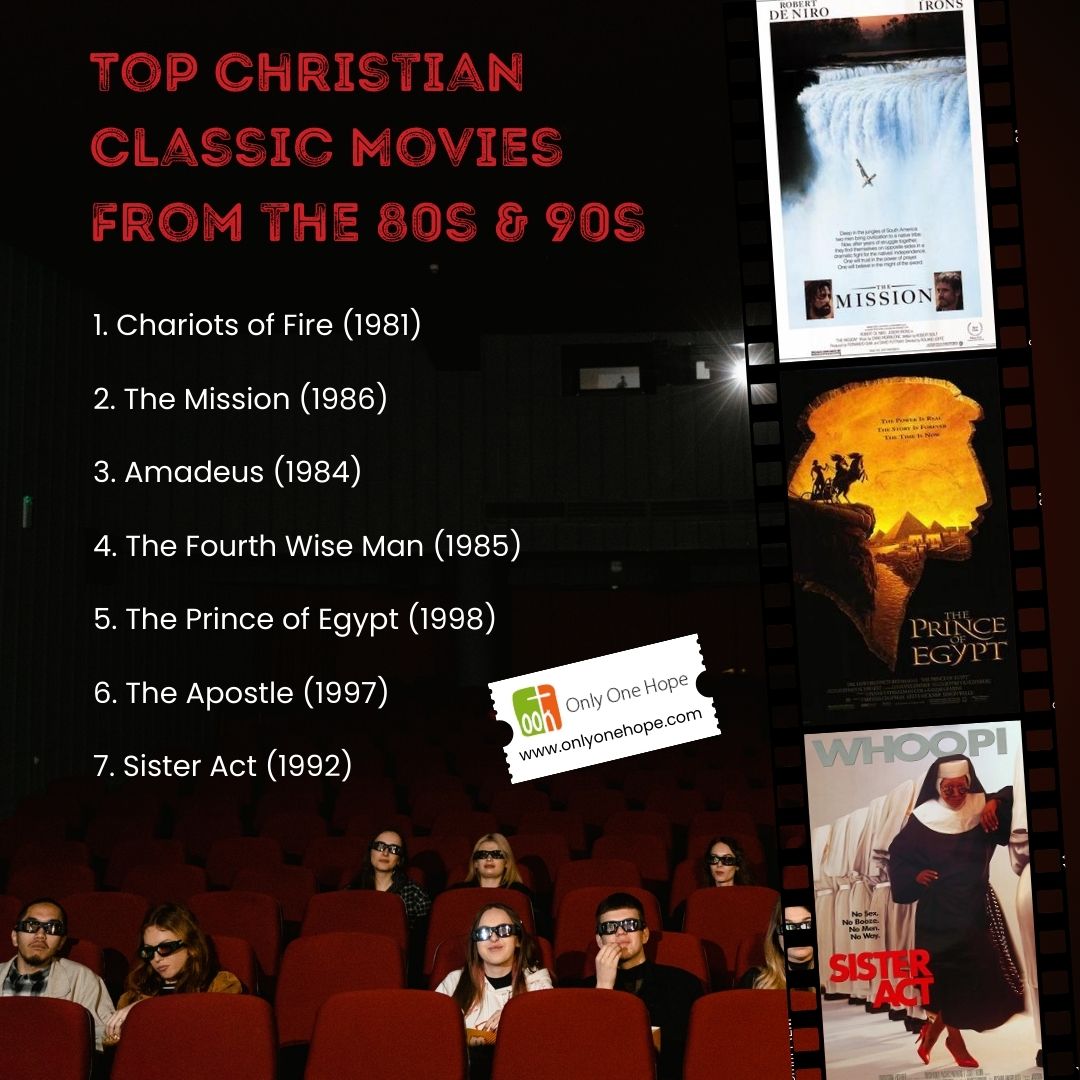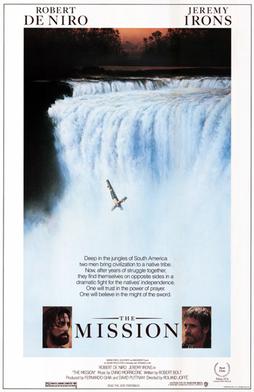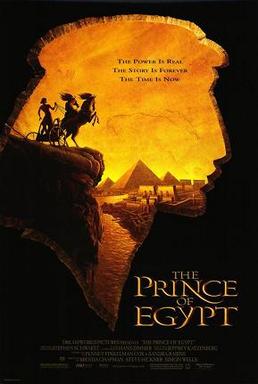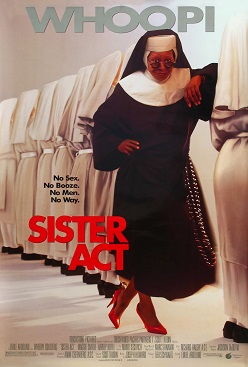Introduction
Christian cinema experienced impressive growth in the 1980s and 1990s, a transformative decade for the film industry. This time produced several timeless classics that won over audiences’ hearts and minds with their stirring stories and spiritual undertones. These Christian films had an impact on viewers all over the world in addition to striking a chord with Christians.
Filmmakers explored the depths of faith, redemption, and the human spirit during a time when storytelling was at its pinnacle, producing timeless works of art. These films provoked viewers to consider their beliefs and values in addition to providing entertainment. They continue to be praised and cherished by viewers as a result, demonstrating the cinema’s enduring ability to uplift the spirit.
The Top Christian Classic Movies from the 1980s and 1990s cover a wide range of subjects that are universal and relatable to people from all walks of life, from grand historical dramas to animated musicals. These movies demonstrate the profound influence that religion has on people and communities, and they are proof of how humanity is always searching for meaning and purpose, regardless of culture or generation. These films have made a lasting impression on cinema through their artistry and storytelling, and they are still revered as classic works of Christian cinema.
Top Christian Classic Movies From the 80s and 90s
1. Chariots of Fire (1981)
British historical drama “Chariots of Fire” was released in 1981. Hugh Hudson and Colin Welland’s film, which won four Academy Awards overall and Best Picture, became an instant classic. It chronicles the real-life experiences of two British athletes who participated in the 1924 Paris Olympics, each motivated by their own distinct goals and convictions.
Two main characters are primarily the focus of the movie:
- Ian Charleson’s portrayal of Eric Liddell Liddell, a devoted Scottish Christian and the offspring of missionaries, has a strong sense of responsibility to God. Even if it means missing his best opportunity to win the 100-meter race, which was scheduled for a Sunday, he refuses to compromise his religious principles because he believes that his running ability is a gift from God.
- Ben Cross’s character, Harold Abrahams, a Jewish student at Cambridge University, experiences prejudice and discrimination as he pursues his athletic goals. He trains tirelessly to compete in the Olympics and demonstrate that he is just as good as anyone else, driven by a desire to break down social barriers and prove himself.
The movie depicts these two athletes’ internal struggles, victories, and ultimate successes as they train for the 1924 Olympics. It aptly captures their steadfast adherence to their convictions as well as the courage they derive from their faith and tenacity. “Chariots of Fire” is renowned for its iconic opening scene, in which the athletes run along the beach while Vangelis’s hauntingly memorable soundtrack plays. This scene has come to represent the film’s legacy. One of the most renowned sports dramas of all time, the film’s themes of faith, conviction, and the pursuit of individual excellence connected with viewers across the globe.
The film “Chariots of Fire” was lauded by film critics not only for its financial success at the box office but also for its cinematography, performances, and compelling narrative. The film has continued to be revered as a cinematic masterpiece, serving as an enduring source of motivation for countless generations of viewers thanks to the enduring lessons it imparts about the significance of preserving one’s honor in the face of adversity.
2. The Mission (1986)
In 1986, Roland Joffé released the historical drama “The Mission” in the United Kingdom. The film, which takes place in the 18th century, tells a gripping tale of faith, atonement, and the clash of cultures in South America during the colonization era.
The narrative of the movie centers on two main characters:
- Father Gabriel, portrayed by Jeremy Irons, is a Jesuit priest who is devoted to his faith and the cause of bringing Christianity to South America’s native people. To protect and convert the indigenous Guarani people, he starts a mission in the South American jungles.
- Robert De Niro’s character, Rodrigo Mendoza: Former mercenary and slave trader Rodrigo is haunted by his violent past and seeks atonement for his transgressions. He experiences a spiritual conversion, joins the mission, and turns into a protector of the Guarani people he once oppressed.
In the movie, Jesuit missionaries battle to defend the Guarani people from oppressive colonial authorities who see them as a threat to their power and economic interests among the natives. As the conflict worsens, the missionaries are forced to choose between their faith and the competing political forces.
The timeless quality of “The Mission” can be attributed to both its breathtaking cinematography and its compelling narrative. Powerfully depicting the complexities of religion, the collision of civilizations, and the effects of colonization are some of the themes that the movie explores. The film’s already powerful emotional impact is amplified by the hauntingly beautiful score composed by Ennio Morricone and the breathtaking photography of South American landscapes.
After its release, the movie received positive reviews and was nominated for several different awards. It was nominated for seven Academy Awards, including Best Picture, Best Director, and Best Actor for Jeremy Irons. It also won the Palme d’Or at the Cannes Film Festival. Beyond its cinematic accomplishments, “The Mission” is still remembered for its provocative analysis of the moral conundrums faced by people trying to balance their religious beliefs with the injustices committed by colonial powers. It is a moving reminder of the resilience of indigenous cultures in the face of adversity and the enduring power of faith.
3. Amadeus (1984)
“Amadeus” is a 1984 biographical drama film that Milo Forman directed and which was based on Peter Shaffer’s stage play of the same name. The movie is a fictional account of the lives of two well-known classical composers, Wolfgang Amadeus Mozart and Antonio Salieri. The story is told from the viewpoint of Antonio Salieri (F. Murray Abraham), a renowned composer and devout Catholic, who is consumed by envy and admiration for Wolfgang Amadeus Mozart (Tom Hulce), a man of prodigious talent. Salieri thinks Mozart has been given an extraordinary musical talent by God while he is only a capable composer.
Throughout the course of the movie, Salieri’s admiration for Mozart’s talent transforms into a fierce rivalry. This is because Salieri becomes increasingly resentful of the younger composer’s genius and the apparent ease with which he can produce works of art. Salieri has a difficult time reconciling his admiration for the talent that God bestowed upon Mozart with his desire to be recognized for the contributions he made.
As the story progresses, the film delves into a variety of topics, including brilliance, animosity, and the complexities of human emotion. It provides a riveting analysis of the human condition, the pursuit of artistic excellence, and the responsibilities that come along with fame and fortune.
“Amadeus” was a commercial and critical success after its release. Eight Academy Awards were given to the movie, including Best Picture, Best Director (Milo Forman), and Best Actor (F. Murray Abraham). Tom Hulce received an Academy Award nomination for Best Actor for his portrayal of Mozart, which received a lot of positive reviews. The film’s remarkable performances, captivating storytelling, and lavish production design are all responsible for its success and enduring popularity. The film’s use of timeless Mozart compositions throughout the story enhances its emotional impact by showcasing some of the composer’s most well-known works.
4. The Fourth Wise Man (1985)
The made-for-television film “The Fourth Wise Man” debuted in 1985. The Other Wise Man, a classic novel by Henry van Dyke published in 1896, served as the inspiration for the Michael Ray Rhodes-directed movie. It tells the uplifting and enlightening tale of a fourth wise man’s quest to discover the infant Messiah and his encounters with various people along the way.
The main character of the movie is Artaban, a Magi and scholar (played by Martin Sheen) who sees the signs in the heavens indicating the birth of a great King, the King of Kings. Artaban gathers three priceless gifts—gold, frankincense, and myrrh—to give to the newborn Messiah after being inspired by the prophecy.
Artaban misses the meeting with the other three wise men due to the difficulties and detours on his journey. As he sets out on his journey to find Jesus, he comes across people who are in need and makes use of his talents to assist them. Artaban does deeds of kindness along the way, like saving a dying man and freeing a young girl from slavery. Despite being delayed repeatedly, he never loses sight of his goal and remains committed to finding the King he seeks.
As more time passes, Artaban’s quest transforms into an unending journey of compassion and selflessness for him and those around him. He interacts with a great number of people who are in need, but he never loses sight of the fact that discovering who the Messiah is should be his primary focus. The movie does an excellent job of depicting Artaban’s profound inner transformation as he comes to the realization that by being merciful and kind to other people, he has unwittingly served the Christ that is in them.
The heartwarming and inspirational movie “The Fourth Wise Man” highlights the true meaning of Christmas—the spirit of giving, love, and sacrifice. The movie sends a strong message about the value of helping others and discovering the divine amid everyday encounters through Artaban’s selfless deeds. Inspiring storytelling and Martin Sheen’s moving performance have turned “The Fourth Wise Man” into a beloved holiday classic, teaching viewers the value of kindness and the real reason for the holiday season.
5. The Prince of Egypt (1998)
A DreamWorks Animation production, “The Prince of Egypt” is an animated musical movie that was released in 1998. The film, which was directed by Brenda Chapman, Steve Hickner, and Simon Wells, is a retelling of the Old Testament book of Exodus’ story of Moses.
In the movie, Rameses II (voiced by Ralph Fiennes) and Moses (voiced by Val Kilmer), an Israelite raised as an Egyptian prince after being adopted by Pharaoh Seti I (voiced by Patrick Stewart), an Egyptian ruler, are both Israelites. Moses learns about his true ancestry as they age and realizes that he is an Israelite, not an Egyptian.
Moses struggles between his loyalty to his adoptive family and his concern for his people when he sees how the Egyptians treat his fellow Israelites harshly. Moses is forced to leave Egypt and start a new life as a shepherd in the desert after an incident in which he kills an Egyptian taskmaster who was abusing an Israelite. Moses has a profound encounter with God through a burning bush during his time in the wilderness. God makes known His intention for Moses to go back to Egypt and lead the Israelites out of their servitude under Pharaoh’s rule. To secure the release of his people, Moses reluctantly accepts his divine calling and stands before the strong Pharaoh.
The unforgettable musical score that Stephen Schwartz composed for “The Prince of Egypt” is renowned for its stunning animation, compelling plot, and captivating storytelling. Some of the songs from the score include “Deliver Us,” “When You Believe,” and “The Plagues.” The movie has achieved cult status as a result of the profound range of emotions it conveys and the powerful messages it conveys about faith, individuality, and freedom. These messages resonate with viewers of all ages.
In addition to its success at the box office, “The Prince of Egypt” was hailed positively by film critics and was nominated for an Academy Award in the category of Best Original Song for the song “When You Believe,” which ended up winning the award. The movie’s status as a time-honored classic has been solidified as a result of its success in employing animation to bring an ageless biblical story to life. This makes the movie appealing to viewers of all religious persuasions.
6. The Apostle (1997)
Robert Duvall, who also plays the lead role, wrote and directed the drama movie “The Apostle” in 1997. The film provides a potent examination of faith, atonement, and the subtleties of human nature. Robert Duvall portrays Euliss “Sonny” Dewey, a charismatic Pentecostal preacher who has a strong faith in God, in the movie. Sonny serves as the pastor of a thriving church in Texas, where he passionately preaches to his followers. His life, however, takes a dramatic turn when he learns that his wife is having an affair with the youth minister of the church.
Sonny attacks the youth minister because he is angry and jealous of him, and in his haste and desperation, he ends up killing him by accident. When Sonny is forced to confront the consequences of his actions, he decides to run away from his previous life.
While Sonny is on a mission to find a new identity, he adopts the alias “The Apostle E.F.” and finds a small church in a Louisiana bayou neighborhood that is having trouble surviving. As the new pastor at that location, he initiates a new beginning and is dedicated to restoring the church and spreading the gospel to the community.
Sonny struggles with his past transgressions and seeks atonement throughout the entire movie. He establishes strong bonds with the locals, sharing both their happiness and their sorrow. Sonny has a complex personality that displays both his shortcomings and his genuine desire to walk in God’s ways.
Widely praised and nominated for an Academy Award for Best Actor, Robert Duvall’s performance in “The Apostle” received high praise. The movie’s honest and direct depiction of a preacher’s inner struggles and the difficulties of religious devotion struck a chord with both viewers and critics. The exploration of topics like forgiveness, self-discovery, and the strength of faith in “The Apostle” are praised for their accuracy in capturing the religious experience of the South. Robert Duvall produced a gripping and provocative character study as a director by treating the material with respect and understanding.
“The Apostle” stands out among religious dramas in the genre thanks to its emotional depth, compelling storytelling, and Robert Duvall’s outstanding performance. It has a profound effect on viewers and has cemented its status as a Christian classic.
7. Sister Act (1992)
Emile Ardolino and Touchstone Pictures created the musical comedy “Sister Act” in 1992. Whoopi Goldberg plays the lead in the movie, which also has a strong supporting cast.
The narrative centers on Deloris Van Cartier, a charismatic Reno lounge singer who is portrayed by Whoopi Goldberg. Deloris flees and seeks safety in a convent after seeing her mobster boyfriend commit a murder. She disguises herself as Sister Mary Clarence, a nun, there. Deloris initially finds it difficult to adjust to the strict regulations and routines of convent life, and her boisterous personality clashes with the nuns’ orderly and quiet environment. She eventually settles in, though, and takes over as choir director for the underwhelming convent choir.
By utilizing her musical talents and more modern approach, Deloris transforms the choir into a lively and emotionally engaging ensemble. As the choir continues to garner more attention and gain popularity, Deloris will have to strike a delicate balance between her rising stardom and the requirement to conceal her true identity from the criminals who are still looking for her.
The film “Sister Act” is a delightful and heartwarming film that combines music, comedy, and themes of sisterhood, friendship, and self-discovery. The film is named after the titular character. The movie demonstrates the power of music to bring people together as well as the importance of recognizing the value of one’s individuality while also looking for common ground.
Whoopi Goldberg delivers a mesmerizing performance, bringing Deloris to life with her signature blend of humor and heart. The narrative receives its character and charm from the supporting cast of nuns in the film, which includes Maggie Smith, Kathy Najimy, and Wendy Makkena, amongst others.
Songs like “I Will Follow Him” and “Oh Happy Day” from the film’s soundtrack, which features a mix of gospel and R&B music, contribute to the film’s upbeat mood and infectious energy.
The movie “Sister Act” was a commercial hit and a well-known classic. It sparked a sequel called “Sister Act 2: Back in the Habit,” and it even served as the basis for a successful stage musical. The movie’s enduring appeal can be attributed to its upbeat tone, humorous scenes, and message about finding meaning and community through music and sisterhood.
Conclusion
It is impossible to overstate the everlasting impact on film history that Christian films that became cult classics in the 1980s and 1990s had. The compelling narratives, captivating performances, and evergreen topics of faith, redemption, and the triumph of the human spirit in these films have resonating effects on viewers of all ages.
From epic historical dramas to moving biographical stories and uplifting biblical epics, each movie has provided a unique perspective on the human experience and the role that faith plays in shaping lives. These perspectives range from grand to intimate to epic. These classic movies have not only entertained audiences but also stimulated their minds to contemplate the ways in which they can improve themselves, their values, and their beliefs.
These films have been seen by people of many different religions and cultures, illustrating how people from all walks of life are looking for significance and meaning. They have demonstrated that storytelling has the ability to elicit powerful emotions, move people emotionally, and motivate people to take positive action.
As you continue to treasure and watch these Christian classics over and over again, you are acting as a living testament to the power of film as a tool for illuminating the human condition and celebrating the resilience of the human spirit in the face of adversity. These films are classics because they have stood the test of time and continue to do so.
As these films continue to be cherished and embraced by new audiences, their legacy endures. They continue to inspire us with their messages of love, compassion, and hope, serving as a constant reminder of the strength of faith and the inherent goodness in each of us. For many years to come, people will cherish and remember these classic works of Christian cinema.





